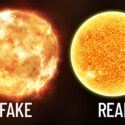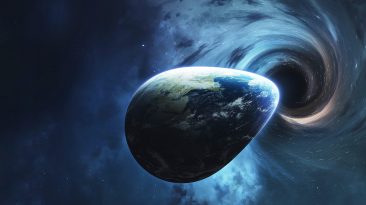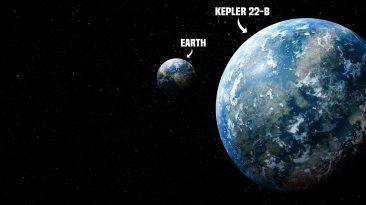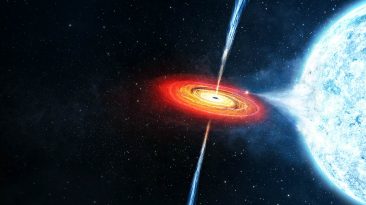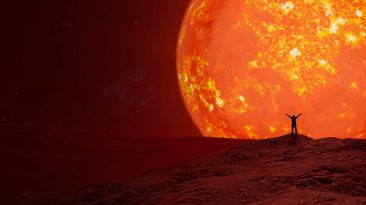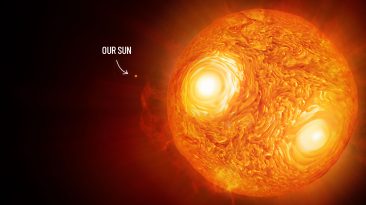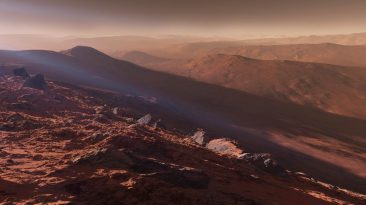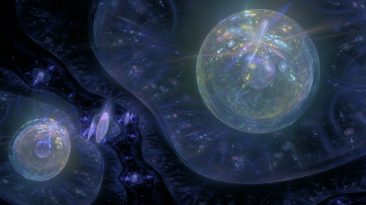The Sun isn’t the biggest thing in our Solar System. And it’s not Jupiter, either. But close. It’s Jupiter’s very own magnetic field. What would it be like if Earth’s magnetic field was as huge as Jupiter’s? How much stronger would our magnetosphere become? Why would it make solar radiation worse? And how could this help your treat anxiety?
Earth is surrounded by electrically charged particles affected by our planet’s magnetic field. This is called the magnetosphere. And it plays an invisible, but very important role in keeping our planet liveable. Without it, we’d be left unprotected from the Sun’s radiation. Plus, our atmosphere would leak out into the great beyond.
So give a big thanks to our magnetosphere that extends as far as 65,000 km (40,000 mi) into space. Our magnetic field is generated by a dynamo effect inside the Earth’s core. That’s when liquid metals in the outer core create electric currents, and then the Earth’s rotation on its axis causes these currents to act like a magnet.
If this magnetic field is so great for us, let’s turn up the dial and make it thousands of times stronger. Fingers crossed it won’t attract meteorites that would level your city in minutes. If you could see Jupiter’s magnetic field from Earth, it would appear nearly three times the size of our Moon. And that’s huge, considering that Jupiter is a whopping 778 million km (484 million mi) away from us.
When you got close to this behemoth of the Solar System, you’d see it extending 3 million km (2 million mi) from Jupiter toward the Sun. And over 1 billion km (600 million mi) in the other direction, all the way to Saturn. If Earth suddenly had a magnetic field this huge, it would easily swallow up the Moon. And it would extend out past Mars, the main asteroid belt and into Jupiter’s orbit.
But there’s a catch. The size of a planet’s magnetic field depends on how strong that field is and the strength of the solar winds it comes in contact with. These solar winds are the reason that the side of Jupiter’s magnetic field facing the Sun is more compressed, while the other extends much farther. Like Earth, Jupiter’s magnetic field is generated in its core by liquid metals.
Enormous amounts of pressure turn liquid hydrogen into a metallic form. Only Jupiter’s core is much larger, significantly hotter and rotates even faster. So for Earth to have a stronger magnetic field, our core would have to speed up and get hotter. Much, much hotter. And if we somehow made our planetary core rotate faster than Jupiter’s, our magnetic field would become 18,000 times more powerful than it is today. But does stronger always equal better?
One of the bigger issues you’d have to confront with this new bigger, stronger magnetosphere is that it would no longer be so good at protecting the planet from dangerous, charged particles from the Sun. That’s because it would now behave a lot like a particle accelerator. This would be extra concerning if you had space travel planned anytime soon.
All because the trapped solar particles bombard satellites, the ISS and the Moon with large amounts of radiation. And nothing would stop them from passing through the ship’s exterior. This would damage all your electronics unless they were stored inside a 1.5 cm-thick (0.5 in) titanium vault. And if you were unlucky enough to be bombarded by these charged particles on a spacewalk, you could get radiation sickness, and increase your chances of getting cancer.
This could also cripple your nervous system. So you definitely don’t want to find yourself floating in space surrounded by a magnetic field with that much kick. Down on Earth, the aurora borealis, or northern lights, would get an upgraded look. These form when the electrically charged particles collide with oxygen and nitrogen atoms.
Now, you would see the display pulsing. Oh, and they’d be dangerous, too. That’s because they’d be emitting X-rays. And that radiation could get funneled right down to the ground. This could lead to our poles becoming completely uninhabitable. How might giving Earth a magnetic field from a planet 1,300 times its size impact you directly?
Try living with a core moving so fast you’d be dealing with a dramatic increase in earthquake and volcanic activity. Let’s not forget animals like bees, sharks and even mud snails that rely on Earth’s magnetosphere to keep them pointed in the right direction. They’d all be thrown off course with potentially disastrous effects on global ecosystems.
Sources
- “How Far Away Is Jupiter?”. Nola Taylor Tillman. 2017. space.com.
- “What Creates Earth’s Magnetic Field?”. Vishnu Varma R Vejayan. 2017. cosmosmagazine.com.
- “Does The Earth’s Magnetic Field Go Past The ISS?”. Jillian Scudder. 2016. forbes.com.
- “Juno Overview”. 2022. NASA. nasa.gov.
- “Why Do Spacecraft Speed Up Near Earth?”. Gemma Lavender. 2014. spaceanswers.com.


